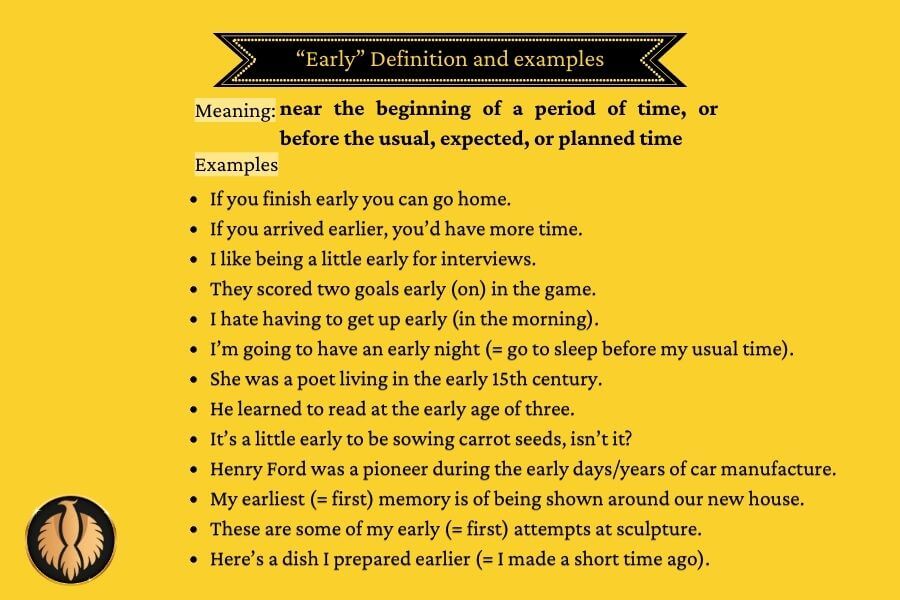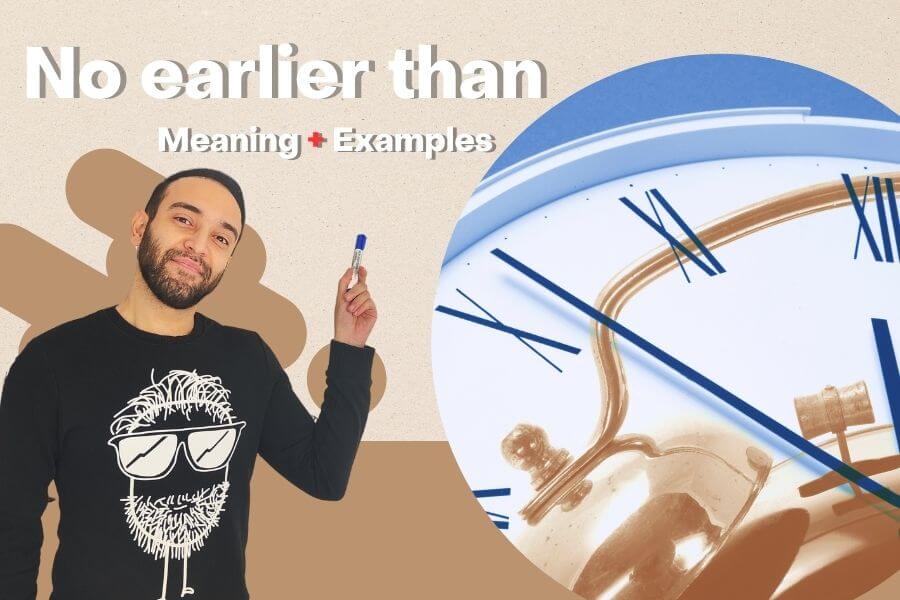Hi there! Are you ready to embark on today’s exciting lesson? Today, we’re diving into the fascinating world of time expressions, focusing on a particularly useful phrase: “no earlier than.”
Imagine you’re eagerly waiting for a package, planning a meeting, or scheduling an event.
The phrase “no earlier than” becomes your trusty guide, helping you understand and communicate when something is expected to happen, but not before a certain time.
It’s like setting a boundary in the timeline, ensuring clarity and precision.
To truly grasp this phrase, let’s start by breaking it down. We begin with the word “earlier.”
As you know, “earlier” is the comparative form of “early,” which means happening before the usual or expected time.
When we add “no” in front of it, we create a phrase that sets a specific time limit, indicating that an event or action will not occur before a certain point.
So, what does “no earlier than” really mean? Simply put, it’s a way to specify the earliest possible time something can happen.
It’s like saying, “This event won’t start before this time, so plan accordingly.”
For example, if a store opens “no earlier than 9 AM,” you know that arriving before 9 AM would be too early.
Let’s explore some examples to see how this phrase works in different contexts:
1.Travel Plans: “The flight will depart no earlier than 6 PM.” This means the earliest the flight can leave is 6 PM, so you don’t need to rush to the airport before then.
2.Event Scheduling: “The meeting will start no earlier than 10 AM.” This ensures everyone knows not to arrive before 10 AM, avoiding any unnecessary waiting.
3.Delivery Times: “Your package will arrive no earlier than Friday.” This tells you that the earliest you can expect your package is Friday, so you can plan your week accordingly.
By using “no earlier than,” you provide clear and precise information, helping to manage expectations and avoid confusion.
It’s a handy phrase that can be applied in various situations, from everyday activities to professional settings.
So, are you ready to master the art of using “no earlier than”? Let’s dive deeper into its meaning and explore more examples to enhance your understanding and communication skills!
Join me for watching YouTube on this topic, no earlier than [specific time or date]:
“Early” Definition and examples

Early (adjective, adverb)
Meaning: near the beginning of a period of time, or before the usual, expected, or planned time
Examples:
- If you finish early you can go home.
- If you arrived earlier, you’d have more time.
- I like being a little early for interviews.
- They scored two goals early (on) in the game.
- I hate having to get up early (in the morning).
- I’m going to have an early night (= go to sleep before my usual time).
- She was a poet living in the early 15th century.
- He learned to read at the early age of three.
- It’s a little early to be sowing carrot seeds, isn’t it?
- Henry Ford was a pioneer during the early days/years of car manufacture.
- My earliest (= first) memory is of being shown around our new house.
- These are some of my early (= first) attempts at sculpture.
- Here’s a dish I prepared earlier (= I made a short time ago).
To learn the usage of the phrase “no earlier than” better, we take a look at two sample contexts.
Learn English for free and have fun with me!: Complete list of Hunting Phrases and Idioms
Samples contexts for “no earlier than” usage
Context 1
Imagine you have applied for a job in a company. Someone from the company calls you to make an appointment for an interview.
The person tells you for example that the interview will begin at 5 p.m. Then she tells you “Please come no earlier than 4:30.”
Now what does it mean? It actually means that they expect you to be there from 4:30 to 5:00 p.m., not sooner than that.
This might be because the number of applicants is a lot and being there too early can make the place crowded and noisy.
Therefore, the actual meaning of “no earlier than [time]” is “from [that time] on”:
Please be there no earlier than 4:30 = please be there from 4:30 on.
Context 2
Imagine that you have participated in a course of study and now you are about to finish it. The person in charge of the course management tells you that when you finish the course, you will be given a certificate.
However, she tells you that “your certificates will be ready no earlier than 30 days after course accomplishment”.
Now what does this mean? It means that it takes some time to prepare the certificates for learners and you will have to wait at least 30 days to receive your certificate.
Thus, they are telling you to not expect to receive your certificates before 30 days later. So, here also “no later than [time])” means “from [that time] on”:
Your certificates will be ready no earlier than 30 days later = your certificates will be ready from 30 days later on.
Learn English for free and have fun with me!: Top 20 Awesome Party Expressions + Examples
Following I have provided more examples of the usage of this phrase in sentences for you to learn its usage even better.
“No earlier than” usage sample sentences

• They said that the final decision would be taken no earlier than June 12.
• The results are expected to be published no earlier than next month.
• I will graduate from university no earlier than next year.
• The appointment is scheduled for no earlier than July 7.
• That plan will be ready no earlier than late next month.
• The parliament man said that the election is expected to be held no earlier than February.
• The launch of the spacecraft was rescheduled for no earlier than November 18.
• NASA is planning for a launch for Endeavour no earlier than next Monday.
• The next mission was scheduled for no earlier than next summer.
• NASA said that the photos of James Web cameras would be ready to publish no earlier than next month.
• He had estimated that the world would end no earlier than 2060.
• Performers are likely to arrive for the competition no earlier than November 15.
• Prosecutors expect opening statements no earlier than Sept. 18.
• The trial will probably end no earlier than the winter 2022.
• The space rover is targeted for liftoff no earlier than June 8.
• They said the protests would be held no earlier than July 17.
• Uncle Jim would reach our town no earlier than next two days.
• Atlantis was scheduled to be launched no earlier than Jan. 19.
• The repair work on the ancient building was started no earlier than the 20th Century.
• Her first book was published no earlier than the mid-1480s.
• The existing barriers were built here no earlier than around 1300.
• My first translation work was published no earlier than 2010.
• His work of art is scheduled to be completed no earlier than next month.
• The movie will be scheduled for a release no earlier than 2026.
• The recreational park will open no earlier than January 2018.
• The Government has planned for an election no earlier than autumn 2023.
• The new software is now scheduled for release no earlier than 2023.
• Their final agreement could be made no earlier than the end of March.
• The team players will be ready for exercise no earlier than May.
• The final exams will start no earlier than next Sunday.
• Our invitation cards arrived no earlier than February.
• The next session of the court trial will take place no earlier than May 10.
• The presidential election is expected to be held no earlier than next fall.
• My sister said she could come to visit us no earlier than next Tuesday.
• Schools will reopen no earlier than November.
• The painting of the house was put off until no earlier than July.
• We planned to make the final decision on going abroad no earlier than next year.
• The scientist argues that the objects found in that cave date back to no earlier than the 10th century.
• The skeletons found in that archeological site dated back to no earlier than the 12th century.
• The sales man was told to go back to work no earlier than two weeks later.
• The unjust rule was annulled no earlier than 18 months after its approval.
• The participants are expected to send their applications no earlier than next spring.
• NASA has planned a second launch attempt of its Mars rover for no earlier than next three months.
• The show is going to be on TV no earlier than Friday.
• Most children will be ready to go to elementary school no earlier than 7 years old.
• They announced that their wedding party will be held no earlier than the beginning of summer.
• My friend decided to tell her decision to live alone to her parents no earlier than her graduation party.
• Please arrive at the party no earlier than 6 p.m. because I may not be home yet.
• Women’s fight for freedom is expected to cease no earlier than next winter.
20 points about using No Earlier Than

- “No Earlier Than” is a phrase used to establish the earliest possible time or date something can occur.
- This term indicates a restriction on timing, setting the boundary for when something can happen.
- Using “No Earlier Than” helps to manage expectations and provide clarity on timelines.
- It is often used in contracts, agreements, invitations, and official documents to specify timing constraints.
- This phrase allows for flexibility while still providing a specific timeframe for an event or action.
- “No Earlier Than” ensures that a particular task or event will not happen before the specified date or time.
- It is commonly used in scheduling appointments, deliveries, deadlines, and other time-sensitive matters.
- Using this phrase can prevent misunderstandings or misinterpretations regarding timing.
- “No Earlier Than” is a helpful tool in planning and coordinating activities with multiple stakeholders.
- It sets a realistic expectation for when something will occur without committing to an exact time.
- This phrase is beneficial when the exact timing of an event is uncertain or subject to change.
- It allows for adjustments to be made without violating the specified timeframe.
- “No Earlier Than” provides a buffer to account for unexpected delays or unforeseen circumstances.
- It can be reassuring to both parties involved by setting a clear timeframe that respects everyone’s schedules.
- This phrase is particularly useful in project management to ensure tasks are completed in a timely manner.
- It helps in avoiding premature or rushed preparations by specifying the earliest acceptable time.
- Using “No Earlier Than” promotes effective time management and prioritization of tasks.
- It encourages a proactive approach to planning and allows for contingencies to be put in place.
- This phrase can convey a sense of organization and professionalism in handling time-sensitive matters.
- Overall, “No Earlier Than” is a valuable communication tool for setting boundaries and managing expectations regarding timing.
Learn English for free and have fun with me!: A Complete List Of Words That Start With “Del”
Concluding note
So, today you learned all you need to know about “no earlier than” meaning and usage.
Now try to make your own sentences using “no earlier than” phrase so that it sticks in your mind.
I hope this lesson would be useful and practical for you. Visit my page for more interesting English lessons. See you soon.
Frequently Asked Questions
- What does “No Earlier Than” mean?
“No Earlier Than” is a phrase used to specify the earliest possible time or date that something can occur.
- Can “No Earlier Than” be used interchangeably with “At Least”?
While they are similar, “No Earlier Than” specifically denotes the earliest possible time, whereas “At Least” implies a minimum time, which could be later than the specified time.
- What does it signify when an event is scheduled “No Earlier Than” a certain date?
It indicates that the event will not occur before the specified date, allowing for flexibility if circumstances require a change in timing.
- How can using “No Earlier Than” benefit project management?
It helps project managers set realistic timelines, account for potential delays, and communicate with team members about when tasks can be completed.
- How can individuals and organizations utilize the concept of “No Earlier Than” to improve efficiency?
By implementing this phrase in planning and scheduling, individuals and organizations can reduce uncertainties, manage expectations, and optimize time allocation for various tasks and activities.

Hi, welcome to my blog! My name is Omid and I am thrilled to have you here! I am an English language teacher with 12 years of experience and hold multiple international certifications (TESOL, IELTS, TOEFL, PTE, CELTA). Additionally, I hold a PhD in Applied Linguistics with a specialization in Teaching English as a Second Language (TESL), which fuels my passion for teaching English and assisting others in mastering the language. To me, nothing is more rewarding than helping individuals enhance their English language abilities through various methods. So, let’s embark on this journey of learning English together.




